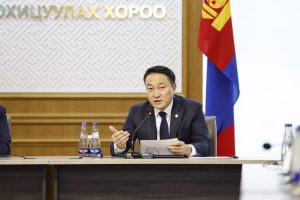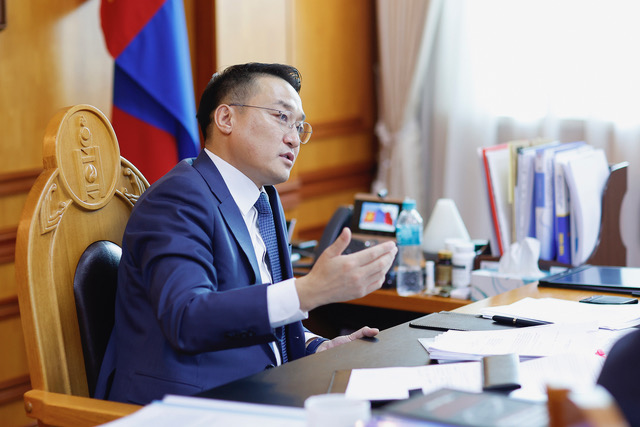On November 26, 1924, Mongolia’s government system shifted from a Buddhist monarchy to a constitutional republic, declaring itself the Mongolian People’s Republic. This year marks the 100th anniversary of the creation of Mongolia’s Constitution.
On this special occasion, the chairman of the parliament of Mongolia, Amarbayasgalan Dashzegve, gave an interview to The Diplomat on the significance of the 1924 Constitution and the progress the Mongolian legislative branch has made over the last hundred years.
On November 26, 1924, Mongolia adopted its first constitution, which ended the religious monarchy and established the Mongolian People’s Republic. From an historical perspective, what did the 1924 Constitution mean for the country’s independence and political system at the time?
The 1924 Constitution marked a pivotal moment in Mongolia’s history, solidifying its sovereignty and establishing the Mongolian People’s Republic. The constitution replaced the religious monarchy with a republican government and formalized governance that enshrined principles like separation of religion and state and free education. These changes in principles have laid the foundation for Mongolia’s modern legal framework. Whilst the original constitution did not explicitly address modern democratic values like political pluralism or comprehensive human rights, it was a progressive document for its time. Most importantly, the 1924 Constitution established Mongolia’s state sovereignty and set the stage for subsequent constitutional developments and amendments.
Adopted during a period of significant geopolitical uncertainties, the 1924 Constitution followed Mongolia’s national revolution of 1911, which restored its independence from the already collapsing Qing Dynasty. By affirming sovereignty and granting supreme power to its people, the Constitution declared Mongolia’s self-determination and governance through the State Great Assembly, now known as the State Great Khural, an unprecedented move toward participatory leadership in the region. Importantly, by aligning itself with the progressive trends of the early 20th century, it secured international recognition of the Mongolian People’s Republic as a sovereign state. Furthermore, as one of the first Asian nations to adopt a constitution, alongside Japan and China, Mongolia demonstrated regional leadership in constitutional governance.
Today, the legacy of the 1924 Constitution endures in Mongolia’s democratic institutions and governance. It laid the groundwork for a century of constitutional evolution, culminating in modern reforms like the 2023 amendments, which enlarged parliamentary representation, from 76 to 126 [seats], and strengthened democratic governance.
In 100 years, Mongolia’s legal framework has evolved to address changing societal and economic needs as with the 1940 Constitution achieving international recognition of independence and the 1992 Constitution institutionalizing democratic governance with political pluralism and a comprehensive rights framework. As we reflect on the 1924 Constitution and its consistent evolution over the last hundred years, we are thankful to those initial 77 representatives from across Mongolia who set us on the path toward a modern democracy.
Reflecting upon the past 100 years, Mongolia has gone through multiple political systems: a Buddhist theocracy, 70 years of socialism, and over 30 years of multi-party governance. What does the centennial anniversary of the country’s first constitution mean to the Mongolian lawmakers and the Mongolian people?
The centennial anniversary of Mongolia’s first constitution is a profound moment and cause for celebration for all Mongolian lawmakers and people. It marks the moment our nation took a transformative step toward sovereignty, equality, and democratic governance, laying a foundation that continues to shape the country’s political and national identity.
In honor of this anniversary, the Parliament of Mongolia has decreed and organized several events across the country. Alongside the traditional wrestling tournaments and state ceremonial events, the Great Khural will host an honorary forum, “Effective Implementation of Parliamentary Oversight,” which will explore the implementation of the newly announced “Three Pillars of Excellence” policy. This policy will ensure the adoption of laws that uphold human rights and swiftly address evolving societal needs with timely regulations that adapt to rapid developments, all the while maintaining a clear distinction between legislation and regulations.
For the Mongolian people, the 100-year anniversary of Mongolia’s Constitution is an opportunity to celebrate the journey from serfdom to citizenship and the introduction of universal suffrage, gender equality, democratic governance, and religious freedom. It serves as a reminder of Mongolia’s political history, independence, understanding the principles of principles and values. It also stands as an opportunity for Mongolian lawmakers and the public to reflect on the progress and understand that there are always additional measures to enhance and strengthen democracy.
This is precisely why the “Three Pillars of Excellence” policy is significant. As Mongolia navigates the complexities of the 21st century, this anniversary and its corresponding legislation only reinforce the nation’s identity as a proud, sovereign democracy built on a century-old foundation of equality and justice.
As chairman, how do you think the enlargement of Mongolia’s legislative branch, from 76 to 126 seats, strengthens the country’s political system or democratic institutions?
The enlargement of Mongolia’s legislative branch from 76 to 126 seats, alongside the adoption of proportional representation for 48 of those seats, marks a pivotal step in strengthening the country’s political system and democratic institutions. These reforms have enhanced inclusivity and representation within the Great Khural, reflecting a broader commitment to constitutional principles of equality and participatory governance.
One of the most significant benefits of this expansion is the diversification of political representation both individually and politically. Proportional representation ensures that smaller parties and minority groups gain a stronger voice in the legislative process, breaking the historic dominance of the two major parties: the Democratic Party and the Mongolian People’s Party. This structural change was evident in the recent 2024 general election, which produced the most diverse parliament in Mongolia’s history, with the current sitting parliament made up of 25.4 percent women and representation from various Mongolian ethnic backgrounds, including the first Kazakh woman and the first members with disabilities.
The reforms also align closely with the spirit of Mongolia’s 1924 Constitution, which envisioned accountable governance and active civic participation. By increasing the number of legislators, the Great Khural becomes better equipped to address the diverse needs of Mongolia’s population, which stretch from urban centers such as Ulaanbaatar to remote grass steppes and the Gobi Desert. These changes fundamentally enhance the capacity of the legislature to address critical social, economic, and regional challenges, ultimately fostering improved policymaking for the entire population.
Our mission is to increase transparency and bring legislators closer to the people they serve. Ultimately, the enlargement of the legislative branch strengthens Mongolia’s democratic institutions by fostering inclusivity, enhancing constitutional governance, and promoting a more representative and accountable political system. These reforms position Mongolia as an oasis of democracy, reinforcing its role as a trusted partner on the global stage.
Given the rise of authoritarianism around the world, how does the current parliament aim to strengthen Mongolia’s constitution in order to protect the Mongolian people’s rights and their civil liberties?
Mongolia’s parliament, the Great Khural, consistently takes proactive steps to strengthen the constitution and safeguard the rights and civil liberties of its people. Over the coming years, the parliament will undertake several constitutional reforms and innovative governance measures such as Parliament 2.0 and the Great Khural’s Strategic Plan. These reforms will enhance the accountability, inclusivity, and transparency of governance, ensuring that citizens’ democratic values and human rights are consistently protected.
As the chairman, I was proud to see that the State Great Khural’s Strategic Plan for 2024–2028 was passed by the parliament recently. As a cornerstone of this parliament, it will oversee the development of a humane, civil, and democratic society in our homeland, prioritizing people-centered policies that will strengthen our country’s democracy and guarantee the civil rights of the Mongolian people.
The strategy is divided into five goals. Primarily, it aims to reinforce the reforms made before the 2024 general election, which guaranteed improved participation in Mongolia’s democracy and increased transparency of lawmaking. Meanwhile, Goals 2, 3, and 5 seek to adapt the internal workings of the Great Khural as the legislature confronts the technological challenges of our time. The parliament embraces technological innovation by incorporating big data into decision-making, aligning legislation with sustainable development objectives and our desire for a greener planet, and strengthening parliament’s foreign partnerships to improve our institutional capacities.
These five goals will ensure that the Great Khural values the fundamental national interests of all Mongolian citizens. As part of these measures, the Great Khural is already implementing legislative initiatives.
For example, recent reforms enhance oversight mechanisms and improve the enforcement of anti-corruption laws, addressing one of the key challenges undermining trust in democratic institutions. These efforts coincide with ongoing initiatives to strengthen judicial independence and the rule of law. To further protect civil liberties, platforms like D-Parliament and D-Petition, launched in 2022, enable citizens to engage directly with lawmakers, ensuring that public opinion continue to shape policymaking and policy-decisions. I believe that these digital tools not only promote accountability but also counter authoritarian tendencies by strengthening democratic participation.
In an era of democratic regression, Mongolia’s parliament exemplifies how legislative institutions can actively safeguard civil liberties and human rights. By embracing inclusivity, innovation, and accountability, the Mongolian State Great Khural aims to and will ensure that its constitutional framework remains a bulwark against authoritarianism and a guarantor of the Mongolian people’s rights and freedoms.
What are some of the challenges Mongolia currently faces in terms of its legal system and how does the new parliament aim to improve these inefficiencies?
In comparison to other older democracies in the world, like the United States or the United Kingdom, Mongolia’s democracy is still very young, but the principle and values have derived from historical times. We believe that in a democratic society, there is constant striving to improve the legal system, whether that be by increasing citizen’s participation, improving transparency and accountability in decision-making, or strengthening mechanisms of enforcement.
The Mongolian public expect their representatives to develop laws that are inclusive, transparent, and adaptable to contemporary challenges. By aligning legislative drafting and enforcement with modern and emerging issues with human rights principles and evidence-based analysis, the Great Khural seeks to rise to this challenge and eliminate historical inefficiencies in the legal framework.
Over the last few years, we implemented legislative measures aimed at addressing these inefficiencies and strengthening the legal framework. A couple notable ones are the anti-corruption initiatives, such as the “Sweeper Act,” which prevents government officials and their families from leveraging public projects for personal gain. The “Glass and Transparency Act” is designed to limit financial entanglement in party politics and parliamentary operations. Additionally, the “Whistleblower Act” further supports transparency by protecting those who expose corruption, offering legal protection and financial rewards to incentivise reporting.
Also, important reforms such as empowering the Mongolian Constitutional Court to resolve citizen petitions concerning breaches of constitutional rights, ensuring greater accountability and responsiveness, are something new and needed to be noted. I believe that these changes are important in strengthening Mongolia’s democratic values and will bring positive impact.
I would also like to add that the government has now fully implemented an auction system for the sale of coal on the Mongolia stock exchange and is beginning to work with civil society and international experts, such as the IAAC [Independent Authority Against Corruption] and the Brookings Institution.
Looking ahead, the Parliamentary Strategic Plan 2024-2028 commits the parliament to strengthening oversight mechanisms by consistently monitoring enacted laws for effectiveness and relevance. It also emphasizes leveraging innovations such as big data and e-parliament technologies to streamline processes and enhance public access to information.
On this centennial anniversary of the original constitution, the Mongolian government and the Mongolian people celebrate the progress we have made at creating a legal system that is transparent, participatory, and capable of addressing Mongolia’s current and future challenges. Much progress has been made. Yet, there is much more to be done.


































